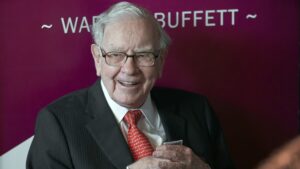Embracing Mistakes: Lessons from Warren Buffett at Berkshire Hathaway
When it comes to investing, few names resonate as strongly as Warren Buffett. The CEO of Berkshire Hathaway has consistently demonstrated a unique blend of humility and wisdom, qualities that have contributed to his remarkable success in the stock market. One of the most striking aspects of Buffett’s investment philosophy is his willingness to own up to mistakes—a trait that sets him apart in the often cutthroat world of finance.
In his recent annual letter to shareholders, Buffett didn’t shy away from acknowledging missteps, a revelation that speaks volumes about his character and approach to business. As he eloquently stated, "The cardinal sin is delaying the correction of mistakes," a sentiment he credits to his longtime business partner, the legendary Charlie Munger. The importance of acting on errors swiftly is a fundamental lesson for investors and business leaders alike.
The Impact of Acknowledging Mistakes
Buffett’s admission of errors—he mentioned "mistake" and "error" 16 times in his letters from 2019 to 2023—serves as a reminder that even the most experienced investors are not immune to misjudgments. His missteps have included everything from hiring decisions to market forecasts, and even investing in the wrong companies. The reflection on past errors underscores a vital principle in investing: no one bats a thousand.
In a world where many leaders may downplay their mistakes, Buffett’s transparency builds trust among his colleagues and stakeholders. Communication expert Matt Abrahams highlights that admitting to errors fosters a culture of openness and collaboration within a team, making it easier for others to seek help and learn from their own mistakes.
Consider the example of Amazon CEO Andy Jassy. Early in his career, he presented an extensive operational plan only to be met with critique from founder Jeff Bezos. Instead of becoming defensive, Jassy apologized and acknowledged the errors, reinforcing the notion that vulnerability can enhance trust and promote teamwork.
Learning and Growing from the Past
A common theme echoed by Buffett and Munger is the importance of reflecting on past mistakes rather than obsessing over them. Munger famously noted at a Wesco Financial Corporation meeting that "nobody bats a thousand" and emphasized the significance of reviewing one’s "past stupidities" as a way to avoid repeating them.
Buffett, too, has publicly recognized the weight of missed opportunities at Berkshire Hathaway. He has lamented opportunities lost due to reluctance and misplaced evaluations—mistakes that, according to him, have cost the company "many, many billions." Yet, despite these setbacks, he remains optimistic about the potential for significant decisions to outweigh past errors. As he articulated in this year’s letter, "Our experience is that a single winning decision can make a breathtaking difference over time."
The Power of Strategic Decisions
Buffett’s profound insight suggests that while mistakes are inevitable, the value of successful decisions can be transformative—turning potential failures into lessons and paving the way for future success. He pointed to key moments like the acquisition of Geico and the hiring of Ajit Jain as transformative decisions that had long-lasting benefits for Berkshire Hathaway. The key takeaway? "Mistakes fade away; winners can forever blossom," he affirmed.
Final Thoughts
For investors and business professionals, there’s a profound lesson in Buffett’s approach to mistakes: Own up to them. Accept them as a part of the journey and approach them with a mindset geared towards learning and growth. At Extreme Investor Network, we strive to embody these principles, providing investors with the insights and tools necessary to navigate the complexities of the financial world while embracing the learning curves inherent in investing.
In the fast-paced world of finance, the ability to admit failure, learn from it, and move forward is a hallmark of true leadership. Embracing this philosophy can not only enhance your investment strategy but also cultivate an environment of trust and collaboration in your professional endeavors. Remember, it’s not the mistakes that define you, but how you respond to them that truly matters in the long run.

